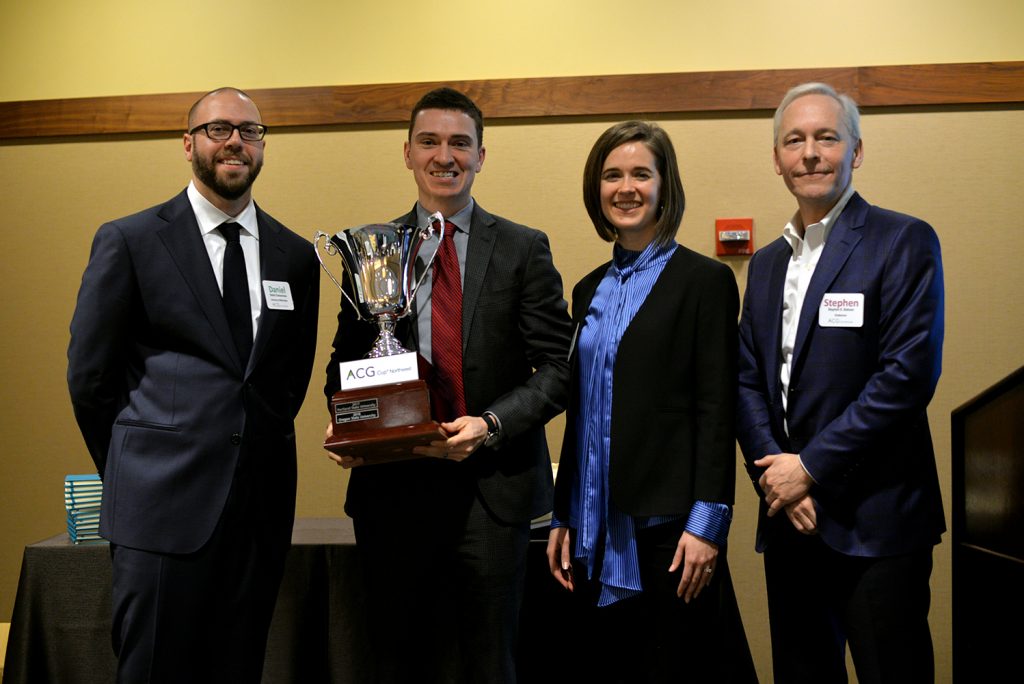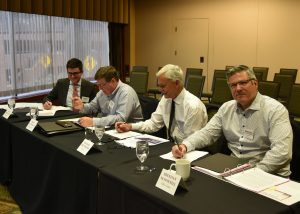3 reasons you should sign up for a Business Case Competition
 I didn’t really know what I was getting myself into when I signed up and began assembling team for the ACG Cup Northwest Finance Case Competition. I knew nothing of ACG (Association for Corporate Growth, a global community for finance business leaders). I wasn’t particularly skilled in or enamored with finance. And I’m a new dad who works full time and takes classes at night. My excuses for saying “no” were plenty and valid. Nonetheless, I threw caution to the wind, joined up with classmates Dan Charbonneau and Marie Kiekhaefer, and we began diving into the case provided by ACG in early January.
I didn’t really know what I was getting myself into when I signed up and began assembling team for the ACG Cup Northwest Finance Case Competition. I knew nothing of ACG (Association for Corporate Growth, a global community for finance business leaders). I wasn’t particularly skilled in or enamored with finance. And I’m a new dad who works full time and takes classes at night. My excuses for saying “no” were plenty and valid. Nonetheless, I threw caution to the wind, joined up with classmates Dan Charbonneau and Marie Kiekhaefer, and we began diving into the case provided by ACG in early January.
Fast forward a month and a half, and our team was holding the trophy at the finals at Portland’s Multnomah Athletic Club, having defeated teams from six other universities in Washington and Oregon.
It was an experience I will never forget, and it certainly validated our team’s hard work and preparation. I wanted to use this post to encourage all students at Foster – and at other MBA programs – to participate in at least one outside case competition. Here are the three most compelling reasons I came up with for doing so:
1: You will improve as a storyteller
In a traditional case competition, the organizers distribute a business case to participating students in which students act as advisors or consultants to recommend a course of action. The ACG Cup is a finance-focused competition, so the case required extensive, complicated financial calculations, assumptions, and sensitivity analyses (many of which still make my brain hurt). Performing these calculations correctly and logically was important, but only part of the judges’ criteria. The organization of our presentation, our team’s delivery and ability to respond confidently to judges’ questions — our ability to tell a compelling story — was, perhaps, even more important than the soundness of our financial models.
After several practice presentations with UW Foster faculty and staff, it was made clear that we needed to remove elements of our presentation that were distracting or which took away from the “story” we were telling. We cut down on the amount of text we had in certain slides and added simple animations to bring in and highlight important details. The feedback we received from the ACG judges clearly illustrated it was our storytelling ability and our clear, confident delivery that made our team stand out. These are mission critical — yet often overlooked — skills to anyone who hopes to lead in business. And we don’t practice them enough. Signing up for a case competition is an excellent way to practice and gather feedback on your ability to tell a compelling story.
2: You will catch the attention of faculty and employers
 You learn to fully utilize the resources at Foster when you sign up for a competition outside of class. We sought help from finance professors, presentation coaches, and program staff, and all were eager and willing to sit down with us, review our analysis, and provide feedback about our presentation. Many of these meetings were after business hours, yet we still received enthusiastic support and no complaints. These practice sessions allowed us not only to improve our presentation, but also to form deeper connections with those in the Foster family. It was yet another reminder to me that faculty and staff are eager to help students in whatever way they can. All we have to do is ask.
You learn to fully utilize the resources at Foster when you sign up for a competition outside of class. We sought help from finance professors, presentation coaches, and program staff, and all were eager and willing to sit down with us, review our analysis, and provide feedback about our presentation. Many of these meetings were after business hours, yet we still received enthusiastic support and no complaints. These practice sessions allowed us not only to improve our presentation, but also to form deeper connections with those in the Foster family. It was yet another reminder to me that faculty and staff are eager to help students in whatever way they can. All we have to do is ask.
The ACG Cup Northwest is attended by finance professionals from around the region. Many of them participated as judges and acknowledged they are looking for talented students to bring onboard. During the lunch, students were encouraged to split off from their teams and connect with industry veterans – another opportunity to catch the attention of influential figures in the finance industry. My teammate Dan, who is seeking a job post-MBA in corporate development and M&A, was, without a doubt, the most talented, well-versed finance student competing. He stood toe-to-toe with the “shark tank” of judges and performed with poise and confidence. Dan walked away from ACG, not only with a handful of business cards from finance executives, but having demonstrated a level of knowledge and experience that would make him an enviable hire for any firm in the industry.
3: Learning to compete is a key skill in business
It may sound obvious, but business case competitions are a great outlet for anyone who loves to compete. I played sports throughout my entire childhood. No matter the sport, the rhythm was similar. We would practice a few times a week, and those practices would prepare us for that week’s game. The practices would be aimless if we didn’t play any games and test the skills we’ve developed. In business school, we spend most of our time in practice. Case competitions allow students to show off what we’ve learned in the classroom.
For ACG, our team spent considerable time in the “shoes” of the judges — thinking through the questions they might ask and determining who would respond to each question type. This is no different than what sports teams do when they scout their opponents as they prepare for a game. And it helped us develop a critical skill in business: understanding your audience, crafting a story that appeals to that audience, and preparing answers to questions that audience may ask.
Winning the ACG Cup Northwest was an experience I’ll never forget. But the lessons I learned throughout the process will prove valuable long after my Foster experience comes to an end. I would encourage any and all current Foster students to prioritize participation in a case competition at some point during your short time here. For a list of all competitions open to Foster students, visit https://foster.uw.edu/competitions/.
Note: This blog post may be most applicable to current and soon-to-be MBA students. But the principles of taking on challenges and learning to compete apply broadly.
***
 Joel Graves is a member of the Foster Evening MBA Class of 2019 where he is concentrating on business strategy and marketing. He manages digital communication for the Washington Roundtable, a public policy nonprofit comprised of senior business leaders from major private sector employers in Washington state. His personal interests include education policy, tech strategy, leadership development, and Seattle sports.
Joel Graves is a member of the Foster Evening MBA Class of 2019 where he is concentrating on business strategy and marketing. He manages digital communication for the Washington Roundtable, a public policy nonprofit comprised of senior business leaders from major private sector employers in Washington state. His personal interests include education policy, tech strategy, leadership development, and Seattle sports.
